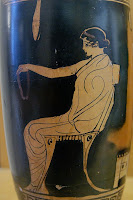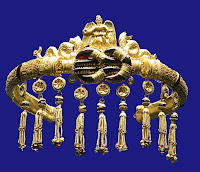 |
| Penelope at her loom (15th c.) |
image credit"When we think of ancient Greece, we think of centaurs and Zeus throwing thunderbolts and stuff, but we don't think of these women trying to take some kind of control of their lives," said Lyon.
"And it seems those were acts that women would undertake as ways of exerting power over their lives."
Such is the quest of Lyon's Pythias, who gets her smarts and love of science from her aging dad.
At the start of the novel, Pythias is seven and boldly declares she wants to be a teacher and doesn't want to get married.
Her viewpoint changes as she matures and, like most women at that time, becomes defined by her fertility and the sexist social beliefs that surround her.
As Pythias's story unfolds, so too does an era of upheaval, as Alexander's death forces Aristotle to flee Athens with his Macedonian family to Chalcis in fear he'll be killed.
But once there, the household is no more stable, and a financially strapped Pythias faces a journey that takes her to the welcoming arms of priestesses, midwives and hetairas (high-end prostitutes).
"I remember really early on the way I kind of imagined her to my editor, we were kicking the ideas around and I said, 'I want her to be a Jane Austen character who likes sex,'" said Lyon.
Lyon said the only concrete facts she had on Pythias came from Aristotle's will, which detailed his plans for her.
"He lays out who he wants her to marry and all the things that he wants to happen to her," said Lyon. "And you get a strong sense of his love for her through the document, and his worry."
Writing the novel made Lyon realize she had "a pretty stereotypical view of what women were at that time."
"I thought: in veils, kept in the house, illiterate, working their looms or whatever and not really doing much else," she said.
Pin It


-2.jpg)


_300_bC.jpg)

